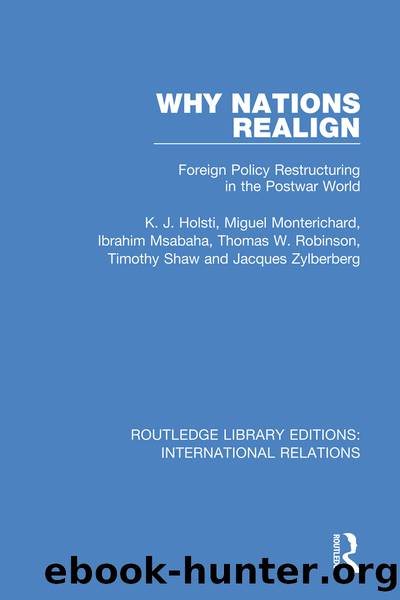Why Nations Realign: Foreign Policy Restructuring in the Postwar World by Kal Holsti

Author:Kal Holsti [Holsti, Kal]
Language: eng
Format: epub
ISBN: 9781138940086
Google: siC8AQAACAAJ
Goodreads: 34628319
Publisher: Routledge
Published: 2015-10-20T00:00:00+00:00
Explanations
Explanations for Burmese foreign policy behavior in the 1960s are difficult to present authoritatively, because interviews with policy-makers are impossible to obtain and because the top leadership â aside from some turgid campaign-style statements and several ideological tracts â seldom commented publicly on foreign policy issues.42 Thus, we have to make numerous inferences from scattered comments, published anecdotes and the personal histories of the main actors.
Three types of explanations can be related to the Burmese attempts to seal off their country and to reduce drastically the level of regional and global diplomatic activity. The first â which is the most prominent in the literature on Burma â emphasizes immediate external security threats. The second argues that isolationism was a response to the domestic insurrections. A third line of analysis, which generally has been ignored, emphasizes the values and attitudes of the Burmese in general, Burma's historical record under colonialism, and the world views, perceptions and personal experiences of some segments of officialdom, the military members of the Revolutionary Council and the Burmese leader Ne Win.
The three types of analysis are not necessarily exclusive. What we want to do, however, is to demonstrate that simple deterministic explanations focusing on a single variable such as the threat from China do not sufficiently account for the broad range of isolationist behavior. While the Burmese were vitally concerned with their relations with China, the evidence indicates that the regime perceived a much more ephemeral threat facing the country, namely, the vast foreign presence in Burma and the consequences it was having on Burmese independence and society. The variety of isolationist policies appeared to reflect deep-seated historical attitudes toward foreigners, elite perceptions of the 'lessons' of the colonial experience and the impressions gained from the post-colonial period under U Nu. Those analyses which assess Burma's behavior from a cold war perspective have generally failed to take into account the personal, sociocultural and national historical experiences that conditioned policy choices.
Most discussions of Burmese isolationism argue that it was a carefully conceived strategy to cope with the threat from China. China was and continues to be Burma's main foreign policy problem because alone among the major powers, Peking became directly involved in the Burmese communist insurrection by providing funds, arms, propaganda services and moral support. These activities were undoubtedly of great concern to Burmese officials, and it is possible that Burma closed down some of the foreign presence in the country to prevent the Chinese from claiming that Burma was veering toward the imperialist camp. According to Seymour Topping, for example, 'Ne Win apparently regards [a balance] as essential to his policy of avoiding any irritation of Peking that would invite pressure . . . Confronted by [the Chinese] levers of power . . . Ne Win has responded by adopting a policy of non-involvement in the cold war.'43 Almost six years later another observer wrote: 'Hoping that China will not increase its activity, [Ne Win] has shaped a foreign policy intended to make Burma as inconspicuous as possible, a policy of giving no offense to its giant northern neighbor.
Download
This site does not store any files on its server. We only index and link to content provided by other sites. Please contact the content providers to delete copyright contents if any and email us, we'll remove relevant links or contents immediately.
| Anthropology | Archaeology |
| Philosophy | Politics & Government |
| Social Sciences | Sociology |
| Women's Studies |
The Secret History by Donna Tartt(19039)
The Social Justice Warrior Handbook by Lisa De Pasquale(12185)
Thirteen Reasons Why by Jay Asher(8887)
This Is How You Lose Her by Junot Diaz(6874)
Weapons of Math Destruction by Cathy O'Neil(6263)
Zero to One by Peter Thiel(5786)
Beartown by Fredrik Backman(5737)
The Myth of the Strong Leader by Archie Brown(5496)
The Fire Next Time by James Baldwin(5429)
How Democracies Die by Steven Levitsky & Daniel Ziblatt(5211)
Promise Me, Dad by Joe Biden(5141)
Stone's Rules by Roger Stone(5080)
A Higher Loyalty: Truth, Lies, and Leadership by James Comey(4948)
100 Deadly Skills by Clint Emerson(4917)
Rise and Kill First by Ronen Bergman(4777)
Secrecy World by Jake Bernstein(4739)
The David Icke Guide to the Global Conspiracy (and how to end it) by David Icke(4699)
The Farm by Tom Rob Smith(4501)
The Doomsday Machine by Daniel Ellsberg(4484)
